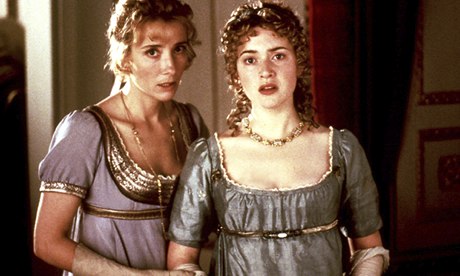Profound changes in attitudes to marriage, money, sex and social etiquette create an array of pitfalls for Austen updaters such as Joanna Trollope

Austen’s novels rely on characters not being able to say things … Emma Thompson and Kate Winslet in the film adaptation of Sense and Sensibility. Photograph: Columbia/Everett/Rex
Informality
To the fan of the original Sense and Sensibility, it is a little shock to be told that Austen's Mrs Dashwood has become "Belle" Dashwood in Joanna Trollope's newly published updating. A little later, we find that the modern version of Colonel Brandon is called "Bill". Naturally, these characters must be given the forenames that Austen never revealed. In this little matter we see the lost layers of formality on which the drama of Austen's dialogue depends. Marianne's sisters think that she must be engaged to Willoughby because he calls her by her first name. When everybody's first name is available to everybody (a man calls his mother-in-law "Abi"), how can surprising familiarity be signalled?Engagement
The plot of Sense and Sensibility (1811 version) requires Edward Ferrars to be in love with Elinor Dashwood but secretly engaged to Lucy Steele, and so unable to fulfil his true passion. Elinor is bewildered by his alternating affection and distraction but, as a man of honour, he cannot escape his proposal to Lucy unless she releases him. Engagement is hard and fast, yet can be effected without a proposal. In Persuasion, Captain Wentworth admits that his flirtatious behaviour with Louisa Musgrove was enough to have made him, inadvertently, "an engaged man" if she wanted to claim him. How can you modernise this? If the 21st-century Edward had a girlfriend he no longer liked and met a young woman he adored, he would valorously dump the first for the second.Marriage
Austen's plots derive from one essential axiom: there is no way out of a marriage. There is one divorce – the Rushworths in Mansfield Park – but at the price of public disgrace. So the story of choosing a partner acquires a huge significance. Mr Bennet once chose Mrs Bennet, and could never go back on his mistake. The bleak comedy of Mr Palmer's marriage to Lady Middleton's asinine sister Charlotte is premised on the fact that it is for life. "Charlotte laughed heartily to think that her husband could not get rid of her." How can you modernise Austen's stories of courtship when the wrong marriage decision can be annulled "by mutual agreement", as they say?More
No comments:
Post a Comment